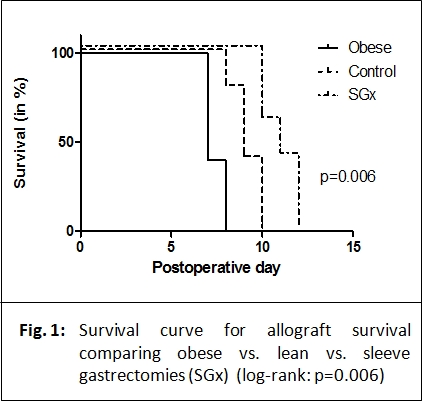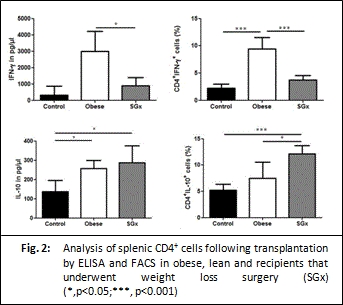Bariatric Surgery Prolongs Allograft Survival by Promoting Th2 Conditions
M. Quante, A. ElKhal, H. Rodriguez, R. Abdi, F. Krenzien, H. Uehara, S. Tullius.
Division of Transplant Surgery and Transplant Surgery Research Laboratory, Brigham and Women's Hospital, Harvard Medical School, Boston.
Meeting: 2015 American Transplant Congress
Abstract number: A5
Keywords: Inflammation, Metabolic complications, Obesity
Session Information
Session Name: Poster Session A: Acute Allograft Rejection
Session Type: Poster Session
Date: Saturday, May 2, 2015
Session Time: 5:30pm-7:30pm
 Presentation Time: 5:30pm-7:30pm
Presentation Time: 5:30pm-7:30pm
Location: Exhibit Hall E
Background: Obesity is linked to chronic low-grade inflammation. We hypothesized that I) obesity will accelerate allograft rejection linked to pro-inflammatory immune responses and that II) bariatric surgery will reverse the detrimental impact of obesity.
Methods: Diet-induced obese (DIO) C57Bl/6 mice and lean littermates received tail skins in a fully MHC mismatched donor/recipient combination (DBA/2⇒C57Bl/6). To test the immunological impact of surgically induced weight loss, we performed sleeve gastrectomies (SGx) in DIO mice (n=5/group). By 2 weeks, when weight loss had stabilized, bariatric surgery animals received skin allografts. Systemic immune responses were tested serially.
Results: Allogenic skin grafts were rejected significantly earlier in obese recipients (median graft survival 7 vs. 9 d. in lean controls). Of note, animals after SGx and consecutive weight loss showed a significantly prolonged graft survival of 11 days (n=5/group; Log-rank test: p=0.006; Fig. 1). Of note, bariatric surgery was linked to a significantly reduced alloreactivity confirmed by ELISPOT analysis (n=6/group by POD 6; p<0.05). Detailed immune analysis subsequent to transplantation revealed a significant increase in IFN-γ production in splenic CD4+ T cells from obese animals while animals following SGx showed a dramatic decrease in IFN-γ production. Furthermore, bariatric surgery recipients exhibited a significantly increased IL-10 production following transplantation (n=6/group by POD 6; p<0.05; Fig. 2).
Conclusion: Obese mice reject allogenic skin grafts more rapidly than lean control animals. Of particular interest, bariatric surgery prolonged graft survival beyond that observed in obese and lean animals by promoting protective Th2 conditions.


To cite this abstract in AMA style:
Quante M, ElKhal A, Rodriguez H, Abdi R, Krenzien F, Uehara H, Tullius S. Bariatric Surgery Prolongs Allograft Survival by Promoting Th2 Conditions [abstract]. Am J Transplant. 2015; 15 (suppl 3). https://atcmeetingabstracts.com/abstract/bariatric-surgery-prolongs-allograft-survival-by-promoting-th2-conditions/. Accessed March 3, 2026.« Back to 2015 American Transplant Congress
